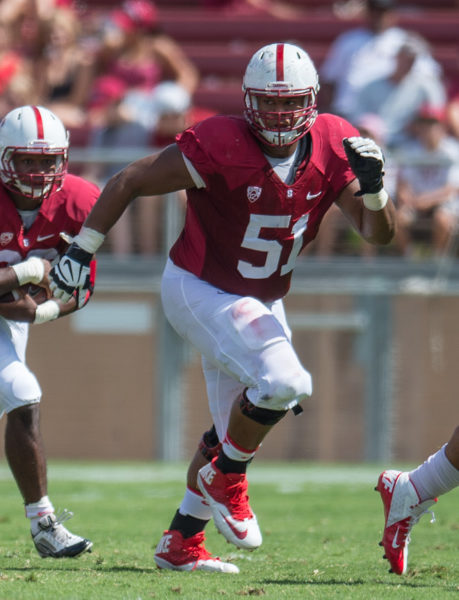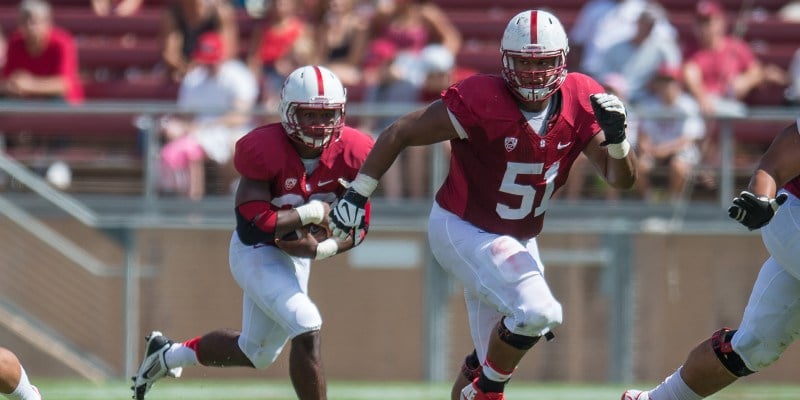Now that the dust has settled on the 2016 NFL Draft, Daily senior staff writer Alexa Philippou caught up with Stanford’s very own first-round draft pick, Joshua Garnett, to get his thoughts on signing with the 49ers and the inside scoop on an auspicious call from a San Francisco telemarketer during the draft.
The Stanford Daily (TSD): I’m sure everyone has been asking you this, but you’ve now had a week for it all to sink in: How excited are you to finally make it to the NFL?
Josh Garnett (JG): It’s definitely been an exciting time, going to the Rose Bowl, training down in San Diego and the Senior Bowl and then doing the pro day trying to impress 32 different teams by going on 32 different “dates” and not knowing which one is going to like you … It was definitely satisfying to know that a team liked me that much, and that definitely made my process much more exciting and helped me these last couple of days since the draft. I’ve been working real hard, going to yoga classes, working out hard, just knowing all the belief they have in me, just trying to reciprocate the attitude they had towards me.

TSD: Did you have any idea that the 49ers were that interested in you?
JG: It definitely blindsided me, knowing they had their pick early in the draft. I was showing interest in them and knew they had interest in me, and I was thinking ‘okay, in the second round’ – if I was still there, I thought San Francisco would take me. I hadn’t heard anything from my agent or anything like that. I saw the 49ers had traded up and then I got a call from a San Jose number, and I answered and it was Chip Kelly. He said, “hey, are you healthy?” I said, “yes, sir,” and he was like, “we’re trading up to get you. Welcome to the 49er organization.” I was ecstatic; I couldn’t have been happier.
TSD: How do you feel about staying in the Bay Area after being at Stanford for four years?
JG: That’s what’s good about it: I built a little bit of a brand at Stanford. A lot of people in the Bay Area know who I am, the person I am and the player that I was. It’s good that the fans from Stanford and the fans of the 49ers that are also Stanford fans are able to see me at that next level and be able to keep a closer eye on me … It’s a familiar face for a lot of people who are just Stanford fans and aren’t really into NFL football, but now, since one of their guys that they follow closely is on one of their hometown teams, it’s a little easier of a transition for them to watch NFL football … I think it works out well for not only myself, but also Stanford and the 49ers organization as a whole.
TSD: Take me through the moment that you were drafted.
JG: I’m from Puyallup, Washington. It’s a small suburb about 45 minutes south of Seattle. I went back home to enjoy it with my family, I didn’t want to go to Chicago or anything. I’m not into the glitz and glamour of what the Chicago experience was …I just wanted to be a bit more intimate with my family. We were just sitting down watching the TV. I was excited for some of the guys who I had been training with in San Diego, for their names to be called. It was just really nerve-wracking, just checking your phone, making sure your sound was on, checking the phone app to make sure you don’t have any missed calls. It was definitely a sigh of relief once you got that phone call and you knew why someone was calling you.
It was actually funny because earlier, before San Francisco was going to pick their first pick, I had gotten a call on my home number from a San Francisco area code, and it was a telemarketer from San Francisco, which is really weird judging that we’re in Seattle. I felt like it was a sign that I was going to be picked up by San Francisco later in the draft, in that second round. It was crazy because it was right when San Francisco was picking too, so we were like, “what are the odds that a San Francisco number is going to call at this exact moment, when San Francisco is picking in the draft?” And then I got the call two hours late, once it was my time to get picked up.
TSD: When the 49ers picked you, Coach Shaw, who was working as a commentator for NFL Network during the first day of the Draft, got emotional on the live broadcast. How did it feel to see that and hear the things he had to say about you?
JG: That meant a lot. Me and Coach Shaw have a really close relationship. That was really truly his class, [with] recruiting, after the Harbaugh era. To see him mature as a football coach and coach differently and the things he does differently, and the way he’s been able to help me mature throughout life. You come in as a 17- or 18-year-old kid out of high school and you leave a 22-year-old man graduating from Stanford … He was able to experience the happiness for the program and for myself. He was a big part of the journey, so even though I wasn’t able to be in Chicago, I’m glad that Coach Shaw could be there in spirit for me … It was great to see him try to keep his composure on TV, because I know a lot of times people try to get on Coach Shaw for not being a very emotional guy, but people saw how much he cared about the players and the program when that happened.
TSD: Can you talk a little bit about your relationship with Coach Kelly? You guys go further back than most draft prospects he’d look at.
JG: I was getting recruited by a lot of places in high school, and Oregon was one of them. Coach Kelly was there recruiting me. It’s obviously tough to turn down a Stanford education and what we were doing football-wise. I ended up coming to Stanford, but I gave Coach Kelly a call and was respectful with it. I said, “hey, Oregon isn’t the best fit for me, but thank you for everything you’ve done.” These coaches take a lot of time and energy to be flying around the country to talk to recruits, it’s obviously tough that they can’t get everybody … It would have been pretty easy to not call him back or not tell him that I’m coming to Stanford, but I think building that relationship on being a respectful guy, he remembers that, so when draft day comes and you’re an NFL coach, it’s not like “that kid blew me off in high school and that’s kind of his personality,” [but rather] “he’s a respectful guy, he’s going to handle his business the way it needs to be handled.” I feel like that went a long way, and for him to be able to be at Oregon when we played them and he saw what kind of player I was, he could see firsthand, better than a lot of coaches who are just watching film, how I play live from high school up to this past Rose Bowl. I think that definitely helped me a lot and built that relationship there.
TSD: I’m sure that played a role in the signing of your former Stanford teammates, Devon Cajuste and Kevin Anderson. How excited are you to be able to play with them in San Francisco?
JG: I’m definitely very excited. We have not only Brandon Fanaika’s brother, Jason Fanaika, who was a Utah guy … but we have Cajuste and Kevin Anderson. To just be with guys like that, be in a not familiar environment with familiar faces, is definitely going to make the transition a lot easier for everyone.
TSD: You may have the opportunity to get some immediate playing time, if not be a starter, this season, due to the 49ers’ losses at the guard position during free agency. With that in mind, what do you see as your strengths and places to improve upon or adjust as you get used to NFL play?
JG: I think my strength is what I did at Stanford. I’m a real cerebral guy, I can learn things fast. In terms of actual football skills, I think I’m an elite run-blocker, especially at the college level I was, I feel like that’s something I always held my hat on was run the ball and be real physical and real aggressive and be able to take it to my opponent. I feel like that’s a double-edged sword at this next level: Guys are a lot faster, a lot stronger, a lot more athletic, better football players with better football IQs. You can’t just fly off the ball, they’re going to take advantage of any aggressiveness you have. I think at this next level [what’s important is] learning from the older guys and being more patient – not trying to just go all out but knowing when you can go all out and when you have to analyze the situation and take the correct footwork and not just fly off the ball.
TSD: I’m sure you’ve been talking to [fellow Bash Bro] Kyle [Murphy] since he was also drafted. Have you talked with any of the other guys as they’ve figured out where they’ve been going?
JG: I’ve been talking to everyone … Everyone’s really excited for the opportunity. It’s good that the Stanford family will have people on teams that they might not necessarily have before. Pretty much anywhere you’ll go, you’ll be able to turn on a game and say, “oh, so-and-so plays for this team,” or “so-and-so plays for this team … ” We’ve got a lot of Stanford guys in a lot of different places.
Contact Alexa Philippou at [email protected].
